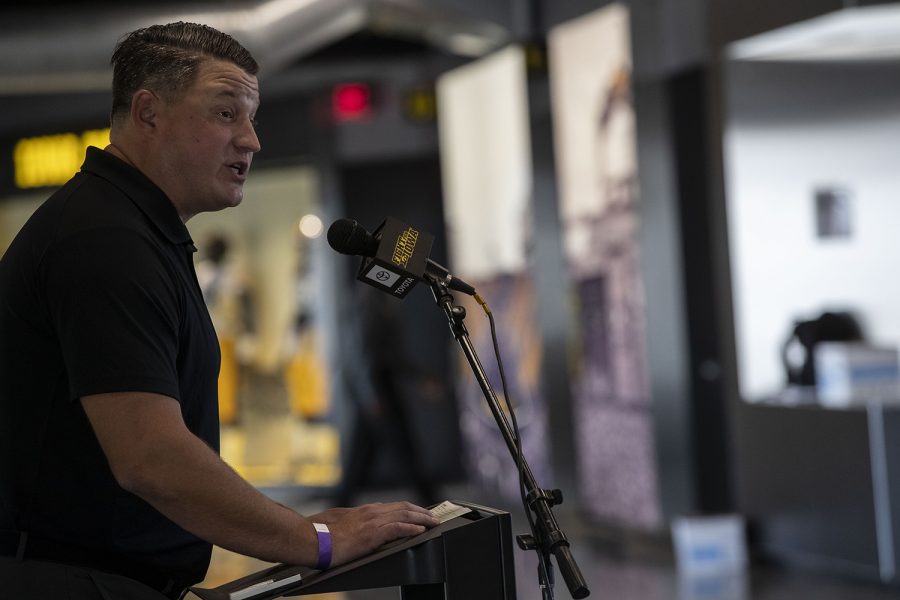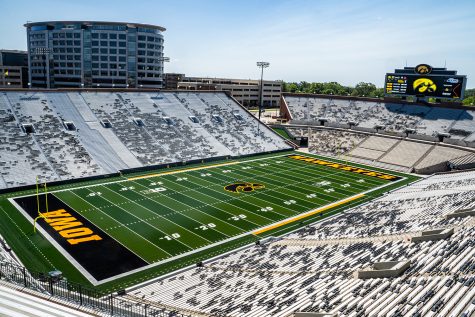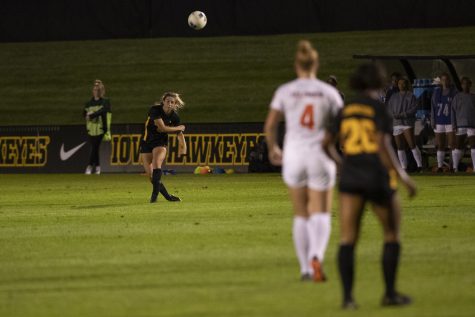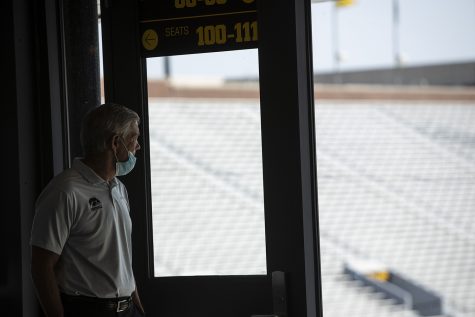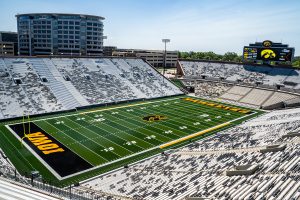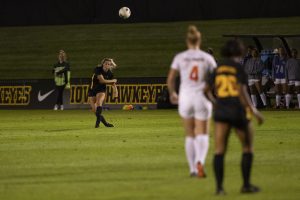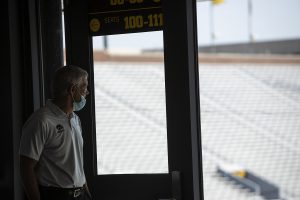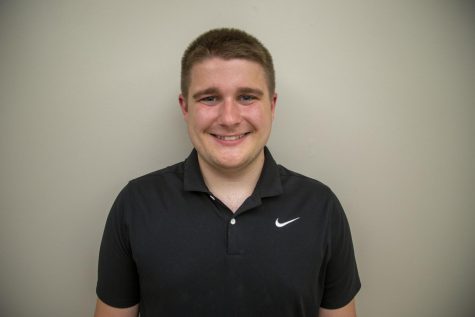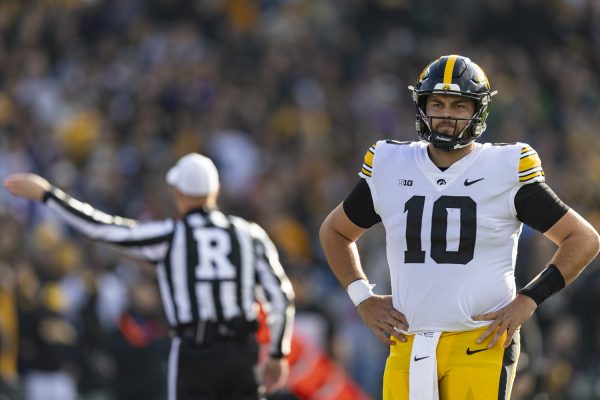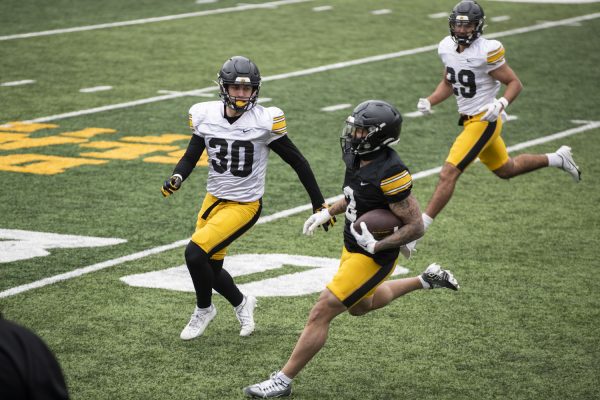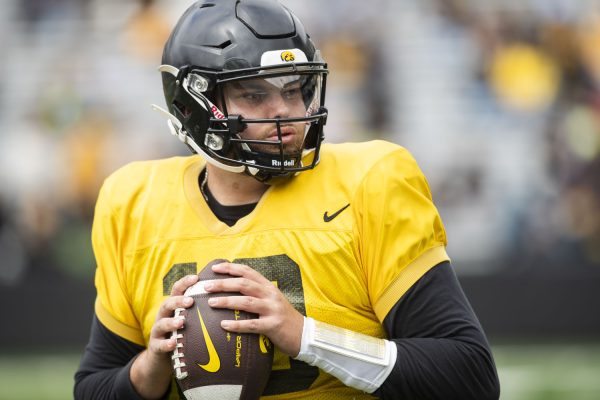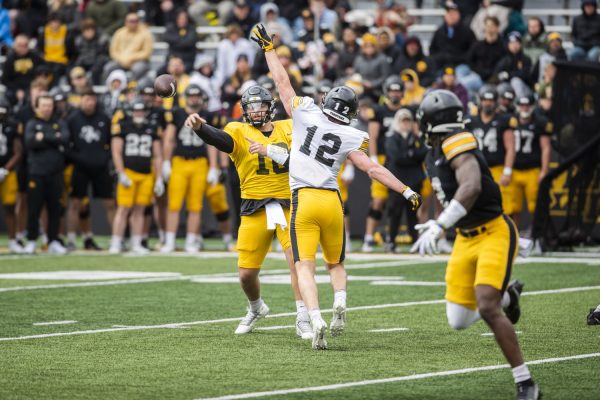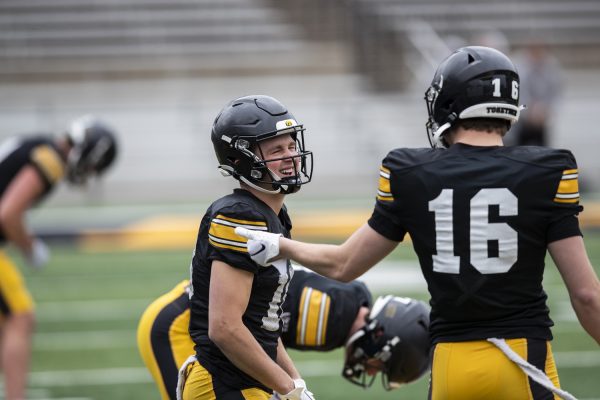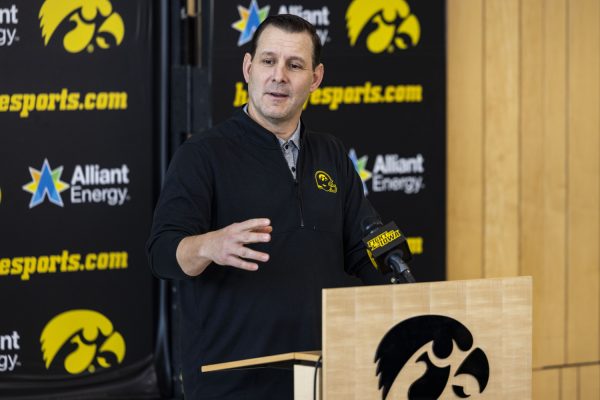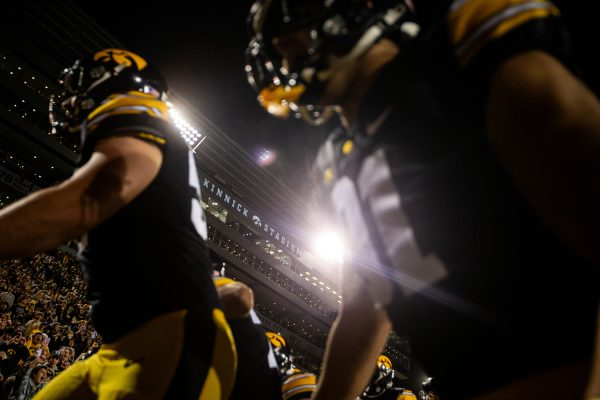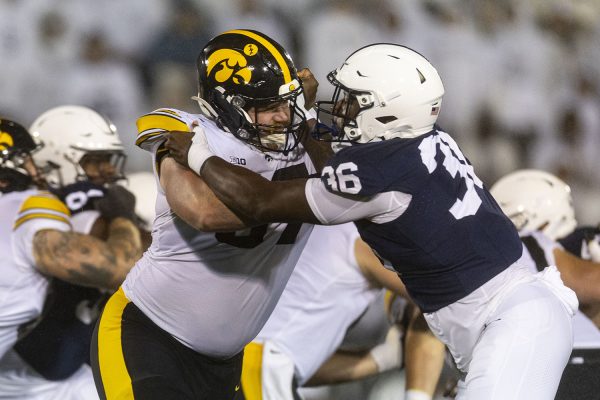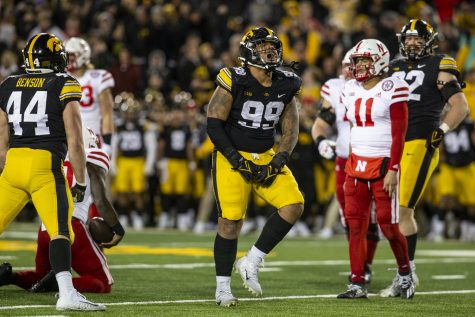Brian Ferentz, Seth Wallace respond publicly for first time to allegations against them, Hawkeye football program
Both assistant football coaches were specifically mentioned in allegations by former players and were said to be demeaning to them.
Offensive Coordinator Brian Ferentz addresses members of the press during football media day in Kinnick Stadium on Thursday, Oct. 8, 2020. (Katie Goodale/The Daily Iowan)
October 8, 2020
Former Iowa strength and conditioning coach Chris Doyle faced allegations of racism and mistreatment by several former Iowa players over the summer before reaching a separation agreement with the university, but he wasn’t the only Hawkeye football coach accused of being demeaning.
Offensive coordinator Brian Ferentz, son of Iowa head coach Kirk Ferentz, and linebackers coach Seth Wallace were both named specifically in allegations for varying reasons, and both publicly addressed the situation for the first time at Iowa football’s media day on Thursday.
Brian Ferentz was accused by several Black former players, including Jaleel Johnson and James Daniels, of being a “problem” on the coaching staff. They said that change in the culture of the program, in part, needed to start with him.
“It was surprising and difficult, and at times very painful to hear those things,” Brian Ferentz said. “I want to make sure to say how appreciative and how much I admire and respect the courage of those players to come forward and tell their truth, and to be as thoughtful and as honest and as open as they were.
“To any player that had a negative experience in our program and did not feel valued or respected on a human level, I am deeply sorry and I offer a sincere apology. My personal goal as a coach is to have a positive impact on young people. And it’s painful to learn that I may have fallen short in that department. But I think it’s a tremendous opportunity to learn, grow, and improve.”
Brian Ferentz was the second-most frequent target of criticism, behind Doyle, from former players. He said he has “no recollection” of making any racist comments.
One former player, Brian Ferentz said, reached out to him and said, “Coach, sometimes you’re just abrasive and your comments could be flippant, and I didn’t know how to take them all the time.”
“When I hear something like that, it’s disappointing,” Brian Ferentz said. “I’m disappointed in myself, that I couldn’t understand how I was being perceived by that player. Not so much what did I say. It’s more about asking the question, ‘What did you hear?’”
Brian Ferentz said, following the allegations, he told the team that he had “no interest” in being part of the program if he wasn’t going to be part of the solution.
Following the outpouring of tweets on the issues surrounding the program’s culture, former Iowa defensive lineman Jack Kallenberger said on Twitter that he left the program in 2019 because of bullying he faced from Doyle and Wallace because of his learning disability.
Wallace said Thursday that he has talked with Kallenberger and his father following the Twitter post in June.
“It was eye opening to see the sadness, the frustration,” Wallace said. “It was a good opportunity to grow and a good opportunity to learn. As coaches we take responsibility with the way any of our players feel — good or bad… It was an opportunity to learn, but it was also an opportunity to rebuild a relationship.”
An investigation into Hawkeye football by the law firm Husch Blackwell found that many players thought the issues surrounding the program’s culture were “not just a Chris Doyle problem.” A report by the firm said that players felt the problems within the program were systemic and could not be fixed simply by getting rid of one coach.
RELATED: Review of Iowa football program states program’s rules ‘perpetuated racial or cultural biases’
Doyle reached a separation agreement, which will pay him $1.1 million, with the UI on June 15. Brian Ferentz and Wallace both remain on staff.
Several current Iowa players were asked about their relationship with Brian Ferentz in the past week and all had favorable comments.
“Brian stood up and said a couple things [in June],” receiver Tyrone Tracy said. “We also had personal conversations, as he had with other players on the team. I respect Brian in every single way. He hasn’t done anything to me. He hasn’t said anything bad to me. So the remarks that were said about him were very shocking.”
“Coach Brian is a great man,” running back Mekhi Sargent said. “He’s a great coach. I’ve never had a problem with coach Brian. Never had a problem with coach Doyle. I can’t speak for a lot of people who did have those problems.”
Junior running back Ivory Kelly-Martin said Tuesday that Iowa players feel more comfortable being themselves in the team facility since allegations surfaced in June.
Senior cornerback Matt Hankins added on Wednesday that he’s seen change within the Hawkeye program in the “best ways possible” since the summer.
“The way I’ve been allowed to lead is really being able to show who I really am,” Hankins said. “Being able to have fun on the field, but at the same time getting the job done when it’s time to get to work.”
Replacing Doyle in Iowa’s weight room on an interim basis is Raimond Braithwaite, who is in his 16th year as a member of the Hawkeye strength staff.
RELATED: Iowa AD Gary Barta: No additional personnel changes following review of Hawkeye football program
Braithwaite, who is Black, said that players have adapted well to him being in charge in the weight room, and added that his approach to strength and conditioning is very similar to Doyle — who was the highest-paid strength coach in the country last season.
“I’ve been close friends with Chris Doyle since 2002 and I have never witnessed or heard him ever make a racial comment,” Braithwaite said. “With that being said, moving forward we need to push and challenge the guys on this team to help instill a confidence in them that they can do things and achieve things that they may not necessarily believe they can. While at the same time we must ensure that they have a good experience while at the University of Iowa.”
Kirk Ferentz said the program has had good conversations and follow-through throughout the summer on how to respond to the allegations. He stressed continuing to move forward as a program. That will be done despite the UI temporarily pausing diversity, equity, and inclusion training provided by federal contractors and federal grantees.
Defensive line coach Kelvin Bell added: “From what our players tell us, the feedback we’re given, every day we’re getting an opportunity to earn trust. Every day we’re getting an opportunity to follow through with the things we said we were going to do. And we want them to hold us accountable to that just like we hold them accountable to the rules and regulations we set. Everything is good right now, but it’s a daily test to make sure that you’re following through on the things you say are important.”
The consensus from the Iowa players and coaches made available to the media this week was that the events from the summer have brought the team closer together.
“At the end of the day we all have to go on the field and play together,” Sargent said. “We all have to get up in the morning and train together. We all have to be in position meetings together. We’re all brothers. We’re all family here. We have a stronger bond now that things are kind of moving forward in the right direction.”



